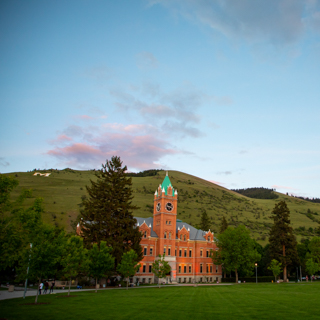Provost's Distinguished Faculty Lecture Series
Past Lectures
Ray Fanning
"News Literacy--Truth vs. Truthiness"
Kelly Dixon
"Archaeology, Global Change, and the Modern World: Tales from the American West"
Jody Pavilack
"From Chilean Coal Miners to Henry A. Wallace: Progressive Visions for the Postwar Era"
Mark Kayll
"1, 2, 3.14 ... Familiar Figures, Fresh Facts"
Dr. Ashley McKeown
"Skeleton Keys: Unlocking Jamestown's Mysteries with Forensic Osteology and Bioarchaeology"
Associate Professor, Department of AnthropologyUniversity Center Theater (UC 3rd floor)
Dr. Richard Bridges
"From the Test Tube to the Brain, the Serendipitous Nature of Neurochemistry"
University Center Theater (UC 3rd floor)
Dr. Jack Stanford
"Rivers of the North Pacific Rim: Linking Fishing and Science"
University Center North Ballroom (UC 3rd floor)
Dr. Charles Nichols
"Composing Human-Computer Interactivity for Musical Performance"
University Center North Ballroom (UC 3rd floor)
Karen Kaufmann
Movement as a Metaphor: Building School Dance Programs
Professor of Dance, School of Theatre and Dance
2011 Recipient of the National Dance Association Scholar/Artist Award
Wednesday, September 14, 2011 at 6:00 p.m.
University Center North Ballroom (UC 3rd floor)
Professor Kaufmann has been spearheading dance integration programs in K-12 schools. This lecture/slideshow will address the successes, challenges and life lessons experienced while advocating for dance in education.
Peter H. Koehn
Symmetry, Synergy, and Serendipity: Reflections on Transnationalism
Professor, Department of Political Science
A 2011 Michael P. Malone International Leadership Award
Thursday, November 10, 2011 at 6:00 p.m.
University Center North Ballroom (UC 3rd floor)
In 2007, Dr. Koehn developed the International Research and Development Project Database as the Association of Public and Land Grant University's first faculty fellow and participated in the Africa-U.S. Higher Education Initiative. Over the course of his career, he has taught and conducted research at universities in Ethiopia, Nigeria, Eritrea, Namibia, China, Hong Kong, and Finland. Dr. Koehn has eight published books, 45 chapters in edited volumes, and 57 articles in peer-reviewed journals. His 2010 book, Transnational Competence: Empowering Professional Curricula for Horizon-Rising Challenges, co-authored with James N. Rosenau, is available from Paradigm Publishers.
Dr. Ray Callaway
Darwin versus Kropotkin: Just how 'red in tooth and claw' is nature?
Ecologist and Professor of Biology, Division of Biological Sciences
2011 Fellow of the American Association for the Advancement of Science
Wednesday, December 7, 2011 at 6:00 p.m.
University Center Theater (UC 3rd floor)
Man's views of the natural world derive from both the relentless need to eliminate competitors in order to survive and the equally persistent need to cooperate with others to avoid being eliminated. This conflict is embodied in the contrasting views on evolution promoted by English scientist Charles Darwin, famous for describing nature as ‘red in tooth and claw,’ and Russian nobleman Prince Peter Kropotkin, who is far less famous for his book, Mutual Aid. Professor Callaway’s lecture will explore competition and mutualism in the context of these two historical figures and link these two processes in a modern synthesis of thought about the nature of nature.
Dr. Thomas E. Martin
Live fast and die young or grow slow and die old: What do field studies of breeding birds across the world tell us?
Todd Continuing Education Building, Rooms 203 and 204
Dr. Paul G. Lauren
Human Rights in Words, Images, and Sounds
University Center Theater (3rd floor)
Elizabeth A. Lo
Making a Language: A slide show retrospective of the artwork of ceramicist Beth Lo
University Center Theater (3rd floor)
Greg Pape
Journey-Work: A reading of new and selected poems by Greg Pape
University Center Theater (3rd floor)
Dr. Jakki J. Mohr
A World Without Marketing: Blessing or Curse?
Jeff & Martha Hamilton Distinguished Faculty Fellow
University Center Ballroom
Dr. Garon Smith
The Chemistry of Snowflakes, Color and Other Fun Stuff
2008 CASE Montana Professor of the Year
NSF Center for Science & Civic Engagement Leadership Fellow
University Center Ballroom
Did you ever wonder how a snowflake can be so beautifully symmetric but unique from all others? How long have you wrongly thought that the colors of the rainbow were abbreviated by the fictitious ROY G BIV? Do you know what chemical compounds changed the name of New Amsterdam to New York City? Explore these and other fun topics in a celebration of whimsical science.
Dr. L. Scott Mills
Wildlife Biology in a Changing World
2009 John Simon Guggenheim Fellow
Tuesday, 10 November 2009, 6:00 p.m. University Center Ballroom
What will happen when white snowshoe hares find themselves in a forest without snow? How can we count lynx or leopards even as they move secretly, unseen, through remote mountain passes? What lessons can animals in U.S. National Parks teach us about studying wildlife in a Himalayan country that is leaping into modernization? Dr. L. Scott Mills will describe how modern wildlife biology science combines traditional field work with the latest advances in mathematics and molecular biology to illuminate surprising answers to these and other questions about how animals respond to a changing world.
